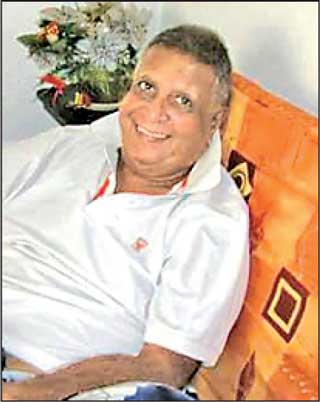Monday Feb 23, 2026
Monday Feb 23, 2026
Monday, 2 August 2021 00:00 - - {{hitsCtrl.values.hits}}
By Sa’adi Thawfeeq
Former Thomian and SSC cricketer and veteran journalist Geoff Wijesinghe lived a full life and despite being confined to his home in Rajagiriya, he was vibrant until his sad demise at the age of 86 on Thursday.
 |
| Geoff Wijesinghe |
His life was as colourful as his profession as a journalist. He could spin you many a yarn that can keep an audience enthralled and rolling with laughter. Although at times he lost his cool and vented his fury at a fellow journalist, he was the first to apologise later for whatever misdeeds or misunderstandings that may have taken place. He held no grudges against anybody and whatever he said came straight from the heart whether it was a word of praise or criticism.
As a cricketer, Wijesinghe is best remembered for the fifth wicket record partnership he put up with Ian Pieris in the 1953 Battle of the Blues cricket encounter against traditional rivals Royal College.
Rolling back the years, Wijesinghe said in an interview: “I went into bat at no. 5 with three down for 13 runs. P.I., my captain, joined me with the score on four for 15. P.I. said, ‘Let’s teach these bloody Royalists a lesson’. When I got out, the score was 201, after a record partnership of 186 runs. P.I. went on to score a brilliant 124.”
Wijesinghe’s contribution to the record stand was 64. Although P.I. got all the kudos, it was Wijesinghe’s steady influence at the other end that enabled P.I. to go for his strokes. Wijesinghe played in three ‘Big Matches’ from 1952-54.
After his school career Wijesinghe continued his cricket with SSC playing in the division I Sara trophy tournament where he had many a story to relate. “In one match against the Tamil Union at the Oval, I dropped a sitter from M. Sathasivam at midwicket, and for a whole week, my captain did not speak to me. At the next match, against Colombo University, F.C. told me, ‘Wijesinghe, you can drop anyone. But, if you drop Satha, your captain won’t speak to you for a week’.”
“On another occasion, Bob Bartels who was on holiday from Lancashire league, was going great guns when he hooked a ball to fine leg, and I imagined I had caught him as there were big cheers. I suddenly realised I had caught him outside the boundary line. The massive cheers turned into more vibrant jeers,” said Wijesinghe, who turned to pursue a career in journalism because he could not attend cricket practices.
He began his stint with the pen as a stringer for the Daily Mirror in 1961 and later became the Editor of the Daily News and the Sunday Observer and head of ‘Lankapuvath’, the country’s only national news agency.
Wijesinghe lamented the decline in the standard of journalism today. “With the breakthrough of electronic and social media, the print media is finding it a challenge to emerge to the forefront and has become a bit stagnant in comparison. There is no news gathering. One of the worst things that had occurred is distributing press releases to journalists. I have experience witnessing how the reporters almost fall over each other trying to get their hands on the press releases. They add their name to the press release and do not even bother to go through the information. In our time, a byline was hard-earned. If you see your name once a year on print, that was a great achievement,” he stressed, adding that unless the reporter gets a real breakthrough story, they were not allowed to use their name with the news items.
“There is a saying that everyone cannot be a journalist. You need a nose for news. Journalism is not for clock-watchers. Live your story and your job and be fearless when pursuing your information,” is the advice Wijesinghe leaves for us before his final departure.